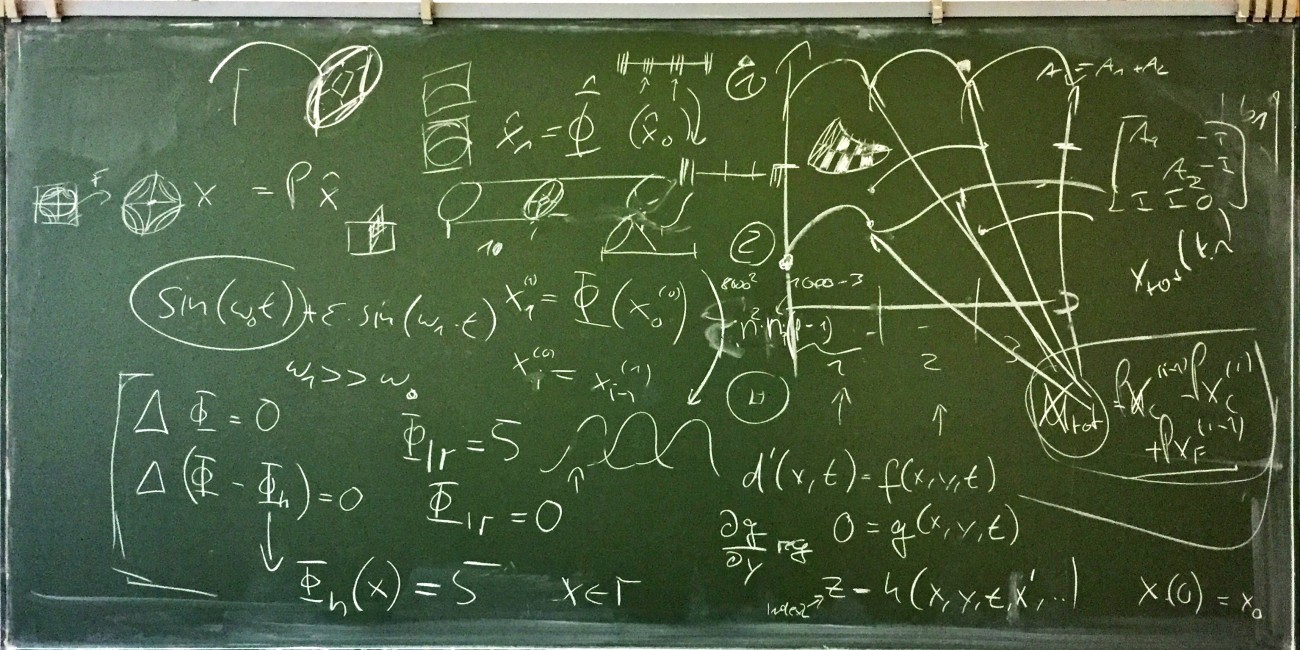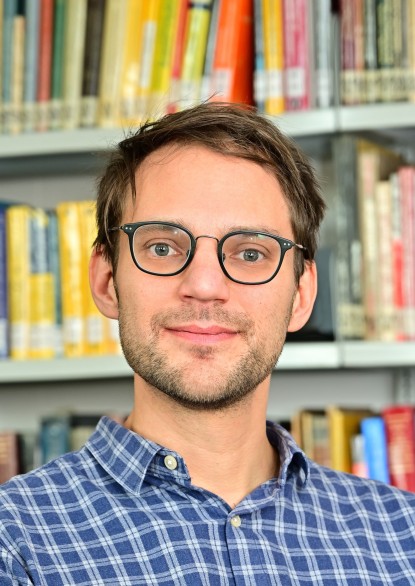| Number | 18-sc-1001 |
| Lecturers | Prof. Dr. Sebastian Schöps |
| Type | Proseminar |
| Semester | Summer and Winter |
| Language | German or English |
| Content | Familiarization with original literature on a given field of electrical engineering and information technology, preparation of a summary written presentation of an original work, preparation of a summary multimedia presentation of an original work. The topics are agreed individually at the beginning of the semester, examples can be found here. Please contact Sebastian Schöps if you are interested or if you want to discuss about possible topics. |
| Number | 18-sc-1010 |
| Lecturers | Anna Ziegler and Prof. Dr. Sebastian Schöps |
| Type | Software lab |
| Semester | Summer |
| Language | German |
| Content | The aim of the course is to give the participants a practical idea of the basics of numerical simulation methods. In practical programming work on the computer, simple techniques and algorithms from typical simulation programs are to be implemented. The focus is on the finite integration technique (FIT). |
| Number | 18-sc-1020 |
| Lecturers | Prof. Dr. Sebastian Schöps and Prof. Dr.-Ing Herbert de Gersem |
| Type | Projektseminar |
| Semester | Summer and Winter |
| Language | German or English |
| Content: | Study of a more complex project in the field of numerical field computation on a computer using commercial, institute-owned or self-written software. The project topics are agreed individually at the beginning of the semester, examples can be found here. |
| Number | 18-sc-1030 |
| Lecturers | Prof. Dr. Sebastian Schöps and Timon Seibel |
| Type | Software Lab |
| Semester | Summer |
| Language | German |
| Content: |
After completion of the module, fundamental algorithms of numerics are understood and can be prototypically implemented and automatically tested in software by the students |
| Number | 18-sc-2010 |
| Lecturers | Prof. Dr. Sebastian Schöps |
| Type | Lecture |
| Semester | Summer |
| Language | German or English |
| Content | Students understand the theoretical and numerical fundamentals of circuit simulation and how the equations can be derived from Maxwell's equations. Circuit properties can be expressed in tems of graph theory. The sparse systems of equations such as the flux/charge oreinted modified nodal analysis can be assembled. In order to solve the obtained systems, different numerical methods for the simulation of circuits are relevant. This includes methods for the solution of linear systems (direct and iterative solvers), root-finding algorithms for nonlinear systems and implicit time integration methods. Mathematical concepts such as stability, convergence order or complexity are known and can be employed to judge the advantages and disadvantages of the various methods. Eventually, the students are able to programm their own circuit simulator, that can return both frequency as well as time domain solutions of electric networks. |
| Number | 18-sc-2020 |
| Lecturers | Prof. Dr. Sebastian Schöps and Prof. Dr.-Ing. Herbert de Gersem |
| Type | Projektseminar |
| Semester | Summer and Winter |
| Language | German or English |
| Content: | Students will be able to simulate independently complex research-oriented engineering problems with numerical field simulation software. They are able to assess whether the project requires research and/or development and find the relevant literature on this independently. They know how to present the results on a scientific level in talks and a paper. Students are able to organize teamwork. Examples can be found here. |
| Number | 18-sc-2030 |
| Lecturers | Prof. Dr. Sebastian Schöps |
| Type | Lecture |
| Semester | Winter |
| Language | English |
| Content | The course covers multiphysical and cross-domain modeling of differential-algebraic systems, e.g. consisting of electrical, electronic, mechanical, hydraulic, thermal, control, or process-oriented components, as well as the coupling of spatially distributed and lumped or integrated components. Concepts of model analysis, simulation methods and their implementation are taught. |
| Number | 18-sc-2040 |
| Lecturer | Dr.-Ing. Felix Wolf and Maximilian Nolte |
| Type | Lecture with exercises |
| Semester | Summer |
| Language | English |
| Content | The Boundary Element Method (BEM) has developed into an important alternative to domain-oriented approaches (like Finite Elements), ever since fast implementations are available. The BEM reduces the dimensionality of the problem and can easily take into account unbounded domains. Starting from the representation formulas of Kirchhoff and Stratton-Chu boundary integral equations are derived. Next, their discretization by collocation and Galerkin methods is discussed. The resulting fully populated matrices have to be compressed for practical applications, by Fast Multipole or Adaptive Cross Approximation methods. Practical examples for application of the BEM are considered, for instance acoustic and electromagnetic scattering problems, and thermal analysis. Programming homework will be assigned, to deepen the students' understanding of the contents. |
| Number | 18-sc-2050 |
| Lecturer | Dr.-Ing. Felix Wolf and Manuel Baumann, PhD |
| Type | Lecture with exercises |
| Semester | Winter |
| Language | English |
| Content | Students with basic programming experience will get an introduction to computational programming of numerical algorithms in C++. The first half of this course will focus on basics of the programming language C++, and highlight aspects in which the language differs from scripting languages such as Python or Matlab. Subsequently, the focus of the course will be on efficient memory management: We discuss modern best practices such as the usage of reference types and idioms like RAII (“Resource Acquisition is Initialization”) rather than classical pointers (“Raw-Pointers”). During the exercises, we illustrate the effect of memory handling for numerical linear algebra applications, and introduce STL (Standard Template Library) data structures in this context. In the second half of the lecture, the students implement more complex algorithms from different application areas using the “Eigen” library (for linear algebra) and openMP (for parallel computing). Here, the focus lies on understanding both libraries, improving the students' programming level from the first lecture half, and solving programming tasks from different areas such as stochastics, numerical solution of differential equations, and approximations. |
| Number | 18-sc-3010 |
| Lecturer | Prof. Dr. Sebastian Schöps and Dr.-Ing. Melina Merkel |
| Type | Lecture with exercises |
| Semester | Winter |
| Language | German |
| Content | Maxwell's equations, basics of numerical calculation of electromagnetic fields, knowledge of the different types of possible errors |
| Number | 18-dg-2030 |
| Lecturers | Prof. Dr.-Ing. Stefan Kurz and Prof. Dr. Sebastian Schöps |
| Type | Lecture |
| Semester | Winter |
| Language | German or English |
| Content: | In the recent years, the amount of literature that deals with physical models in terms of differential forms (DF) has increased strongly. For instance, DF allow a clear and elegant representation of electromagnetics (EM). The operators grad, curl, and div of vector analysis are replaced by a single operator of the exterior derivative. Similarly, the integral theorems of Gauss and Stokes are replaced by a single integral theorem. Vector analysis is limited to three dimensions, while DF can be applied to any dimensions. This is useful for the relativistic formulations in four dimensions. Since DF can be canonically integrated over appropriate domains they lend themselves naturally to discretizations of the finite integration type. This lecture series provides an introduction into DF calculus, and its relation to vector analysis. Maxwell‘s equations and the constitutive relations are expressed in terms of DF, and the main steps into discretization are outlined briefly |
| Number | 18-dg-2190 |
| Lecturer | Prof. Dr.-Ing Herbert de Gersem, Prof. Dr. Manfred Kaltenbacher, Prof. Dr.-Ing. Annette Mütze and Prof. Dr. Sebastian Schöps |
| Type | Lecture with software lab |
| Semester | Summer |
| Language | English |
| Content | Physics of electric machines, fundamental equations and modeling of electric machines, finite element (FE) method, loss models and coupling FE and electric networks, sensitivity analysis and optimization, electric and thermal stresses in insulations, multiphysics and coupling to mechanics and acoustics |
| Number | 18-st-2070 |
| Lecturer | Prof. Dr.-Ing Herbert de Gersem, Prof. Dr. Heinz Köppl, Prof. Dr. Markus Meinert, Prof. Dr. Sebastian Schöps and Prof. Dr. Florian Steinke |
| Type | Software Lab |
| Semester | Summer |
| Language | German (English on request) |
| Content | In 6 experiments the basics of scientific computing are practiced on the PC. For this purpose, key methods of numerical mathematics are used to solve exemplary engineering problems from electrical engineering and their possibilities and limits are examined. |
| Number | 25-00-2022 |
| Lecturer | Mario Mally, Robert Hahn and Prof. Dr. Sebastian Schöps |
| Type | Seminar |
| Semester | Winter |
| Language | German |
| Content |
The “Introduction to CE studies” program is aimed at all CE students in their first semester. The aim is to highlight the framework conditions and requirements of the introductory phase of studies and to introduce students to the specifics of CE studies. Building on this, helpful techniques are provided to enable self-organized and independent study. In terms of content, the program deals with the special situation of CE students in their first semester, who are in transition from school to university and have to face new demands of learning and working at university. These include self-organization, new and unfamiliar examination situations, new ways of communicating content and working effectively in teams. The program consists of seminar sessions with guided group work phases, mentoring with individual advice and an exam simulation. |
| Number | 25-00-2023 |
| Lecturer | Mario Mally, Robert Hahn and Prof. Dr. Sebastian Schöps |
| Type | Seminar |
| Semester | Summer |
| Language | German |
| Content | The course is designed to meet the needs of CE students in the Bachelor's degree program and meets the demands placed on CE students during this work-intensive period. As part of the seminars and in teamwork, the basics of scientific work and presentation for engineers are dealt with and systematically developed by the participants in independent work. In addition, the course offers the opportunity to acquire introductory and advanced knowledge in the use of LaTeX. Furthermore, numerical calculations with Python will be discussed and an introduction to computing on a high-performance computer will be given. For further support, help desks are offered in addition to the workshops, where all questions regarding the advanced processing in the examination stages can be clarified in consultation hours with the trainers. The presentation of the results of the scientific term paper concludes the course. |


